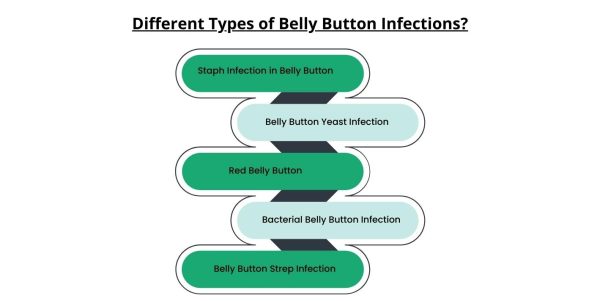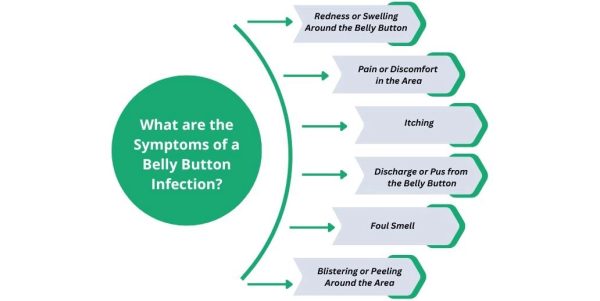Have you ever noticed an unexpected discomfort in your belly button, only to discover redness or discharge? Belly button infections are a surprisingly common issue that many people overlook, but they can quickly become bothersome or even serious if not addressed. Whether it’s an irritation from improper hygiene or an infection stemming from a piercing, these infections don’t discriminate.
Studies suggest that women might be slightly more prone to belly button infections than men, primarily due to more frequent body piercings and certain biological factors.
Understanding the basics of this condition, including its symptoms, causes, and treatments, is crucial for everyone to maintain good hygiene and avoid complications.
Can a Belly Button Infection be Serious?
While a belly button infection can cause discomfort and irritation, it’s rare for it to be life-threatening. Most belly button infections are mild and can be treated effectively with proper hygiene and topical antibiotics. However, in rare cases, an untreated or severe belly button infection can spread, leading to complications like abscesses or sepsis, which can be dangerous.
It’s crucial to recognize the signs of a belly button infection early and seek medical advice if symptoms worsen or do not improve. While the chances of a belly button infection becoming fatal are low, it’s always best to err on the side of caution and consult a healthcare professional if you’re concerned.
Different Types of Belly Button Infections?
Belly button infections can arise from various sources, each with distinct characteristics and treatment approaches. The navel’s warm, moist environment makes it a breeding ground for different types of infections. Here are some of the common types:
- Staph Infection in Belly Button: Caused by Staphylococcus bacteria, this infection often results in redness, swelling, and pus-filled bumps.
- Belly Button Yeast Infection: Triggered by Candida overgrowth, this type can cause itching, redness, and a white, cheese-like discharge.
- Red Belly Button: Redness around the navel can indicate irritation or an underlying infection, often accompanied by tenderness or swelling.
- Bacterial Belly Button Infection: Various bacteria can infect the belly button, leading to pain, odor, and discharge, often requiring antibiotic treatment.
- Belly Button Strep Infection: Caused by Streptococcus bacteria, this infection can result in inflammation, redness, and sometimes fever, needing prompt medical attention.
What are the Symptoms of a Belly Button Infection?
Recognizing the symptoms of a belly button infection is crucial for early treatment and preventing complications. These infections can manifest in various ways, often starting subtly and escalating if left untreated. Key symptoms to watch for include:
- Redness or Swelling Around the Belly Button: This is often the first visible sign, indicating inflammation or irritation.
- Pain or Discomfort in the Area: A common symptom, it can range from mild tenderness to sharp pain, particularly when touched.
- Itching: Often associated with fungal infections, persistent itching can be a sign of an underlying issue.
- Discharge or Pus from the Belly Button: This is a clear indication of infection, especially if the discharge is yellow or green.
- Foul Smell: An unpleasant odor emanating from the belly button can suggest an infection, often accompanied by discharge.
- Blistering or Peeling Around the Area: Particularly common with piercings, this can indicate an infection or allergic reaction, requiring immediate attention.
What Causes a Belly Button Infection?
Belly button infections can result from a variety of causes, often linked to poor hygiene, skin conditions, or external irritants. One of the most common causes is the buildup of bacteria or fungi in the warm, moist environment of the navel, particularly in individuals who sweat excessively or have deep-set navels.
Piercings can also introduce bacteria, leading to infection if not properly cared for. Additionally, certain skin conditions, like eczema or psoriasis, can create an environment conducive to infection.
Other contributing factors include obesity, which can increase the likelihood of moisture accumulation, and the presence of foreign objects, such as lint or hair, which can irritate the skin and lead to infection.
It’s essential to maintain good hygiene and care for any piercings properly to reduce the risk of developing a belly button infection.
Management and Treatment
When it comes to belly button infection treatment, the approach depends on the severity and type of infection. Generally, maintaining good hygiene is crucial. Cleaning the area with mild soap and water, followed by drying it thoroughly, can prevent further bacterial or fungal growth. Over-the-counter antibacterial or antifungal creams may be effective for mild cases.
However, if symptoms persist or worsen, it’s essential to consult a healthcare professional who may prescribe stronger medications or, in severe cases, antibiotics. Additionally, natural remedies can complement conventional treatments, offering relief and speeding up the healing process.
Home Remedies
For those looking for natural ways to manage belly button infections, several home remedies can be helpful:
- Neem: Known for its antibacterial properties, neem can be used as a paste or oil applied to the infected area to help reduce infection.
- Chamomile or Marigold Oil: These oils have anti-inflammatory and antiseptic properties. Applying a few drops to the affected area can soothe irritation and promote healing.
- Turmeric: This spice has powerful anti-inflammatory and antimicrobial properties. A paste made from turmeric powder and water can be applied to the belly button to help fight infection.
- Tea Tree Essential Oil: Tea tree oil has strong antifungal and antibacterial qualities. It can be diluted with carrier oil and applied to the infection to reduce symptoms.
- Rubbing Alcohol: Cleaning the belly button with rubbing alcohol can help disinfect the area and prevent further bacterial growth. However, use it sparingly, as it can dry out the skin.
These remedies can be useful for mild infections or as a complement to medical treatments. However, it’s important to monitor the infection and seek medical advice if symptoms do not improve or worsen.
Can Belly Button Infection Go Away By its Own?
In some cases, a mild belly button infection may resolve on its own, especially if it is caused by minor irritation or a transient bacterial imbalance. Maintaining good hygiene and keeping the area dry can help the infection clear without medical intervention.
However, if symptoms persist, worsen, or if there’s significant discomfort, it’s important not to rely solely on self-care. More severe infections, particularly those caused by specific bacteria or fungi, typically require medical treatment to prevent complications and ensure proper healing.
When to See a Doctor
It is crucial to seek medical attention if a belly button infection shows no signs of improvement after a few days of self-care or if symptoms are severe. Key indicators that warrant a doctor’s visit include persistent or worsening redness, swelling, pain, discharge, or an unpleasant odor.
If there are systemic symptoms such as fever, chills, or fatigue, these could indicate that the infection is spreading and requires immediate medical attention. Prompt consultation with a healthcare professional is essential to receive the appropriate treatment and avoid potential complications.
Bottom Line
While the question “Can a belly button infection kill you?” may seem alarming, the vast majority of these infections are mild and manageable with proper care. It’s crucial to recognize the symptoms early and take appropriate steps, including good hygiene and medical consultation if needed. While severe complications are rare, they can occur, emphasizing the importance of not ignoring persistent or worsening symptoms. With timely treatment and attention, most belly button infections can be effectively treated, ensuring a swift and complete recovery.



